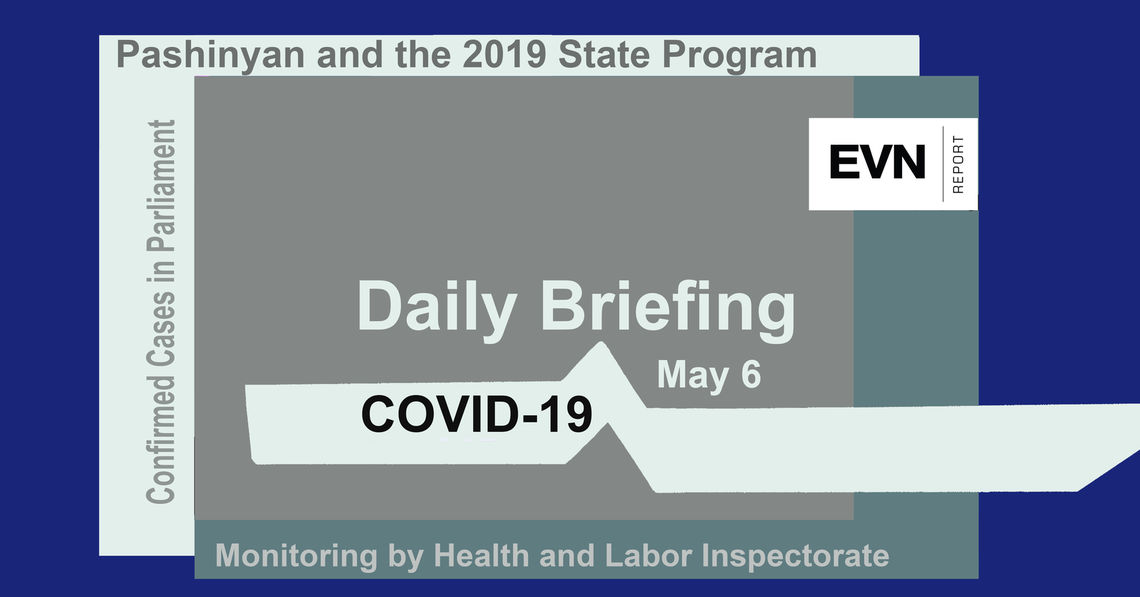
Cumulative Cases: 2782
Active Cases: 1600
Recovered: 1135
Deaths: 40
Monitoring by Health and Labor Inspectorate
4 p.m.
During a press conference, Hakob Avagyan, Head of Armenia’s Health and Labor Inspectorate, said that the rules and regulations regarding the activities of those business entities that were allowed to operate during the State of Emergency (SOE) were in place since March 20. The Inspectorate conducted regular monitoring activities to ensure that businesses are aware of and comply with the set rules. Between March 20 to April 6, monitoring was conducted in over 860 organizations and the activities of 98 were temporarily suspended because of the registered violations (initially, activities were suspended for 6 hours, but this has been expanded to 24 hours). Other than monitoring, the Inspectorate also makes sure businesses are aware of the new rules. To date, the Inspectorate distributed informative materials to over 1,083 businesses, 390 of which were through email.
Since January 24, Armenia’s seven border checkpoints (including Zvartnots International Airport) have been under strengthened surveillance. Over 47,400 people coming to Armenia have filled out special forms, 217 have been hospitalized directly from the seven border checkpoints, others were self-isolated or quarantined, if necessary. On May 4, restrictions on certain forms of economic activity were lifted, with the condition that they should follow the set safety and sanitary regulations. Avagyan noted that, since May 3, the Inspectorate has been monitoring the activities of those entities as well, and based on the registered violations, the Inspectorate recommended the Commission suspend the activities of eight businesses.
Confirmed Cases in Parliament
1:30 p.m.
Speaker of Armenia’s National Assembly Ararat Mirzoyan confirmed that there are a number of parliamentary staff members who have been infected with COVID-19. They have been hospitalized and contact tracing has been carried out; all those who have been in contact are under quarantine. Mirzoyan urged parliament members and staff to wear protective masks and gloves.
Update on Number of Cases
11 a.m.
The Ministry of Health reported that 163 new cases of COVID-19 were confirmed in Armenia and 24 patients recovered, bringing the total number of infected to 2,782, of which 1,135 have already recovered and 1,600 are active cases. The Ministry said that one patient infected with COVID-19 has died but the virus was not the cause of death. To date, 26,928 tests have been conducted.
Pashinyan and the 2019 State Program
10 a.m.
Prime Minister Nikol Pashinyan was in Parliament to present the report on the implementation and results of the 2019 state program, during which he also spoke about the government’s response to COVID-19. He explained that the government’s initial course of action was targeted towards avoiding panic. The government’s second most important priority was to ensure that the healthcare system is ready to provide adequate medical care to all those infected with the virus. To achieve this goal, the government has increased the initial bed capacity for the infected patients from 300 to 1,500. An additional 150 beds will be allocated in the coming few days. To date, over 6,000 people have been quarantined in hotels.
The PM also touched on the 16 assistance packages aimed at mitigating the economic consequences of COVID-19. Assistance has already been provided to over 21,000 business entities and over 1 million people. As of May 5, Armenian banks and credit organizations have granted loan repayment holidays to 472,000 people and 15,000 legal entities. Pashinyan said that, in the early days of the outbreak, there were concerns that Armenia would experience social collapse and a humanitarian crisis. Despite those concerns and some fluctuation in exchange rates for the Armenian dram in mid-March, the financial system was quick to regain stability. Pashinyan also noted that, unlike many developed countries, Armenia did not experience shortages of food supplies and was able to effectively stabilize the price fluctuations in the market (although certain price increases were registered). On the one hand, the price of fertilizer, which is an essential supply for the agriculture sector, has increased, while on the other hand the price of diesel fuel, which again is needed in the agriculture sector, has substantially decreased.
As of April 29, 2020, over 620,900 people received salaries (in the overall amount of 123 billion AMD (based on income taxes paid). In comparison, the numbers for February, before the lockdown, were lower with 618,000 receiving salaries in the overall amount of 119 billion AMD. Pashinyan reminded that it was in summer of 2019 that the number of registered jobs in Armenia was above 600,000. He went on to say that the government was able to effectively manage the situation, and avoid social crisis in the country.
Speaking about the assistance packages aimed at helping citizens with their utility payments, Pashinyan stressed that the government has allocated about 5 billion AMD, over 2 billion AMD of which is in peoples’ accounts as prepayment for next month. He also said that over 1.8 billion AMD in assistance was allocated to people who do not necessarily need it. The PM mentioned that the government was challenged to come up with maximum targeted forms of assistance and in the meantime assistance was also provided to people who do not need it. He once encouraged all those to take initiative and reallocate the money to a family that they think needs it more.
Pashinyan noted that since March 2020, over 70,000 Armenians returned to Armenia, with the help of diasporan philanthropic organizations and the government. 23,000 of them returned since the start of the State of Emergency (SOE) on March 16. In the first three months of 2020, 17,000 more people returned than left the country. To assist all those citizens who do not have the opportunity to leave the country for seasonal work (because of the restrictions imposed by different countries), the government has decided that more than 100 educational and healthcare facilities in the country will be renovated and constructed.

